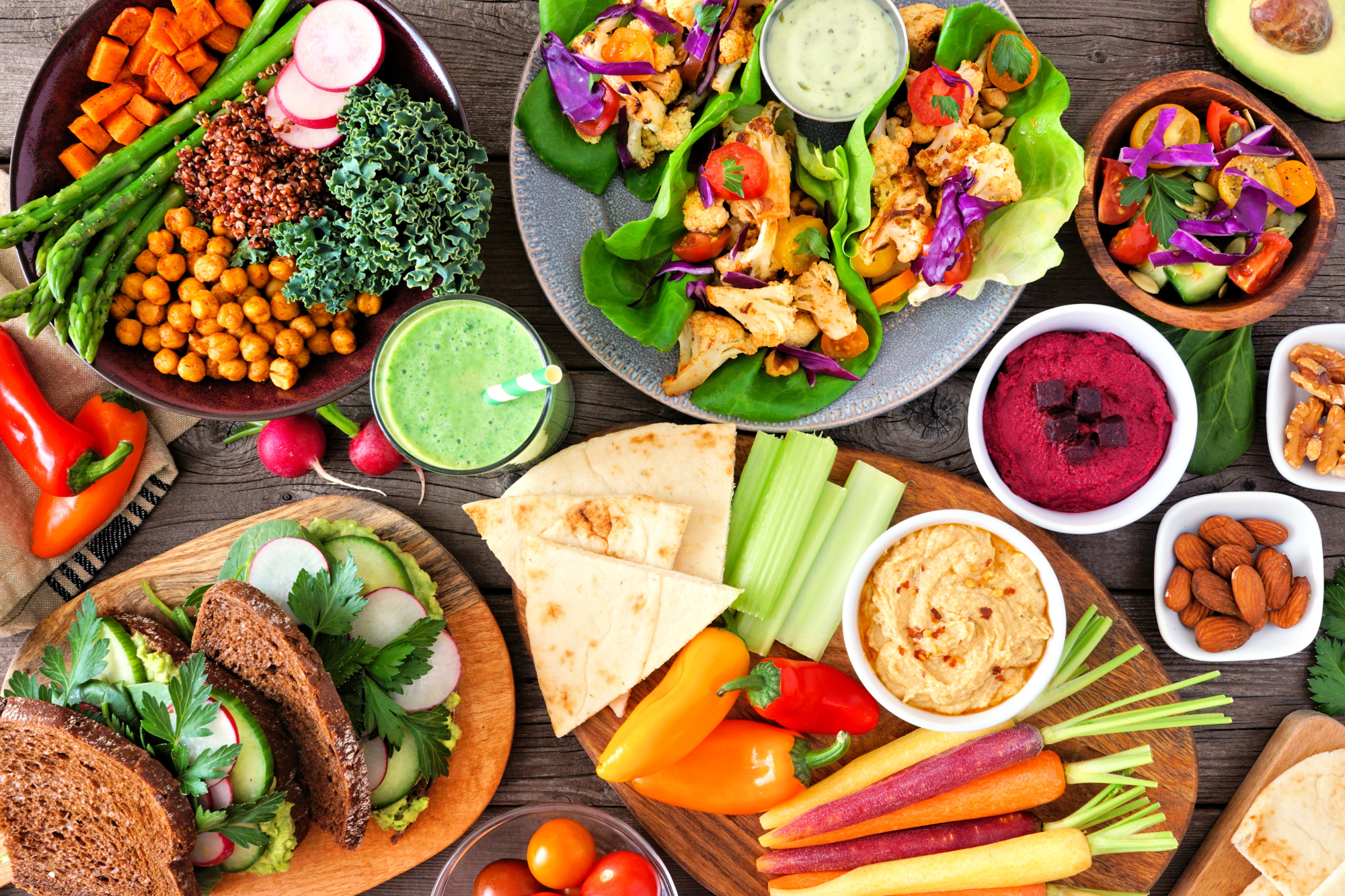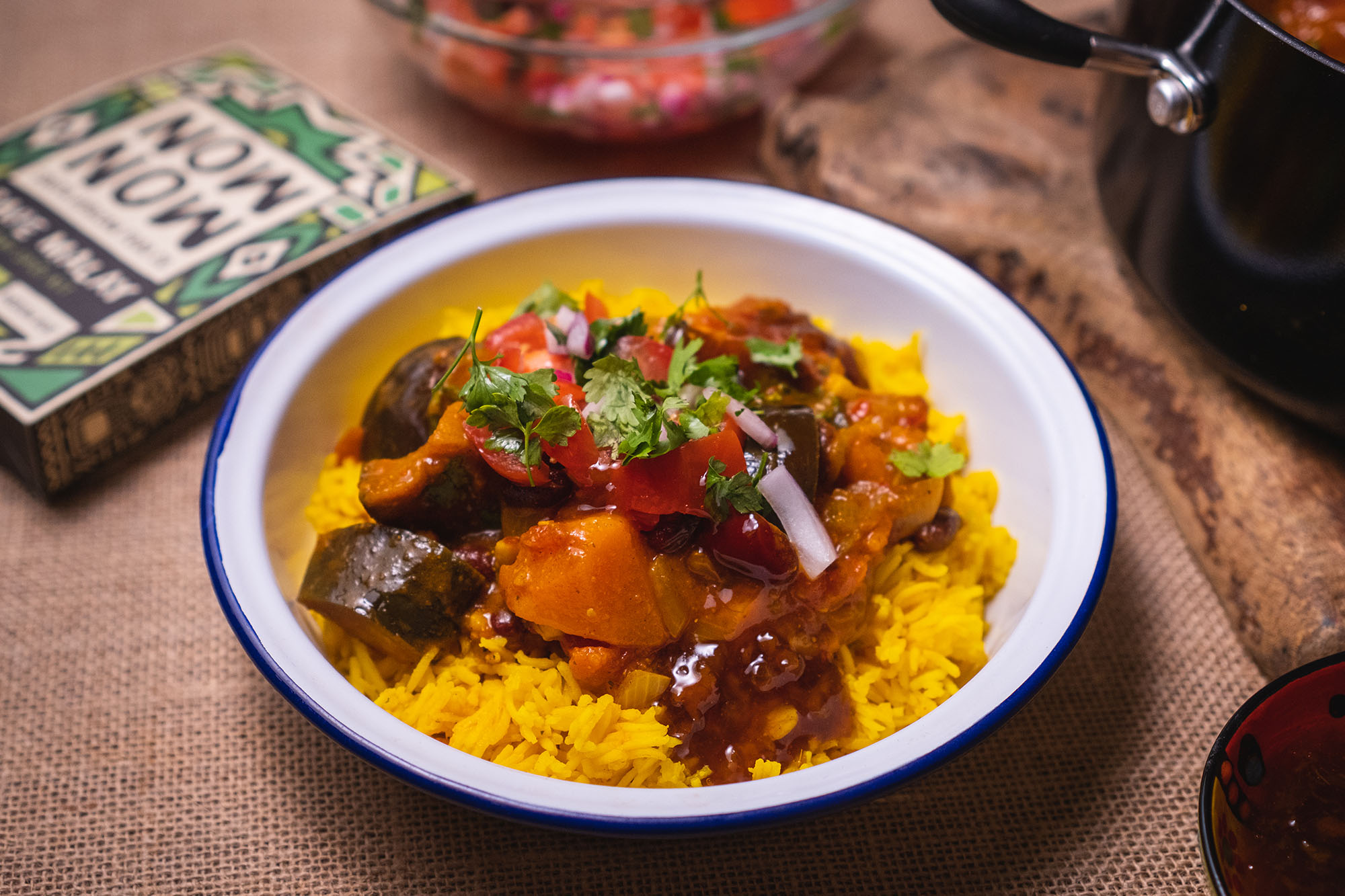Part II
As we learned in the first instalment of this series, people worldwide are linked by time-bound and seasonal events, with many of these revolving around food and drink.
Almost every month sees a national or international celebration, with people around the world celebrating occasions like Easter, Christmas, Diwali, and Rosh Hashana, as well as seasonal trends like barbecuing in summer and the adoption of comfort foods in winter.
With growing awareness of plant-based lifestyles, there has also been a wave of new time-bound events and food challenges that encourage people to try eating more meat- and dairy-free foods.
If your business is looking to target the ever-growing number of consumers eating plant-based products, you can boost sales, as well as enhance your company’s reputation by engaging with all these events, celebrations, and challenges.
Part I of this series of articles looked at how Veganuary and Flexitebruary can be used by businesses to increase the adoption of their plant-based products, as well as how Easter is a prime time for marketing plant-based chocolate. Today, we will delve into three new key moments of the year that can be used to promote meat-free products – No Meat May, Meat Free Weeks, and BBQ season.
No Meat May
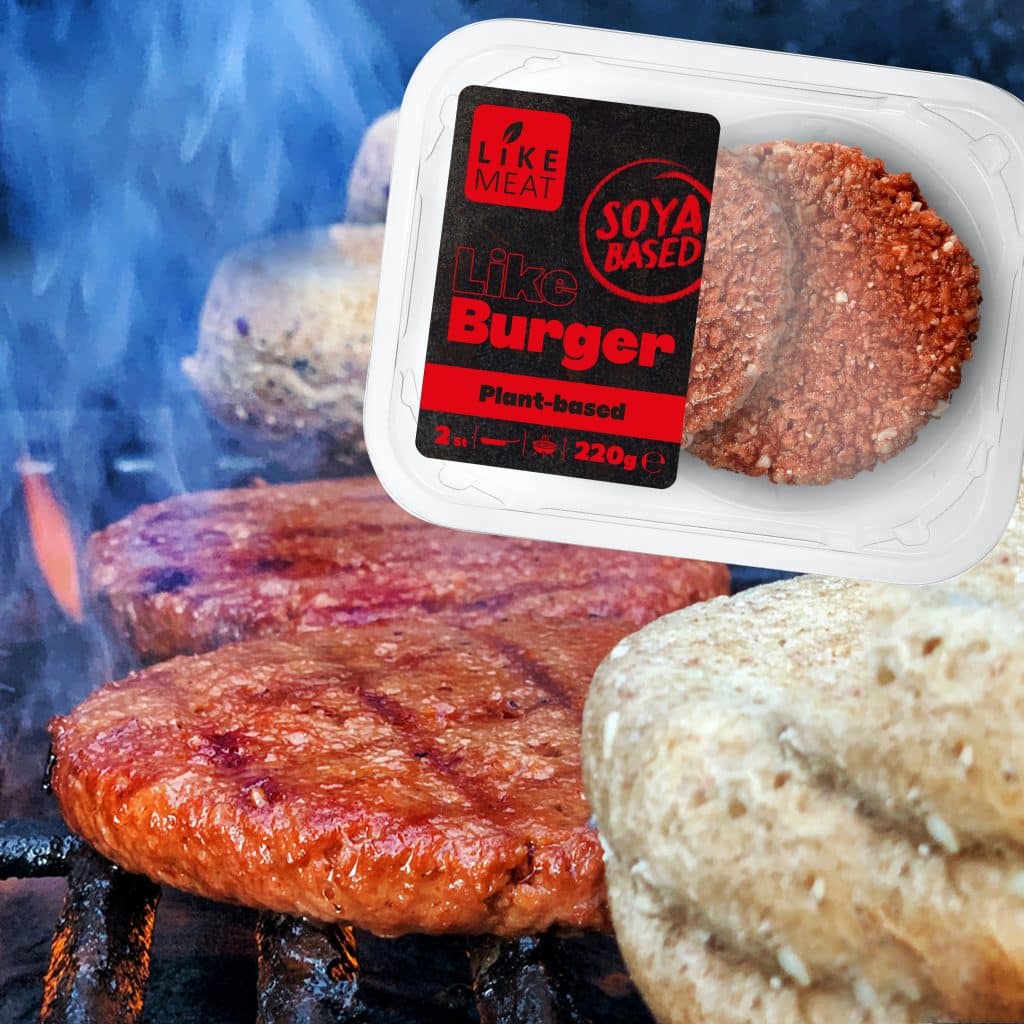
Having started in Australia in 2013, No Meat May is a challenge that sees people around the world giving up meat products for the month of May. Similar to Veganuary, the event encourages people to sign up for access to a wealth of resources throughout the month, all of which are aimed at supporting participants to shift to ‘healthier, more sustainable and kinder plant-rich diets’, with an emphasis on ensuring that they have an enjoyable experience.
In 2021, No Meat May saw 65,055 registrants from around the world. Although the event might not see quite as many sign-ups as Veganuary, on average, each person who signed up last year encouraged one friend or family member to take part alongside them, extending participants to more than 130,000 people. On top of this, a post-challenge survey found that 93% of participants have continued to reduce their consumption of animal products, with 30% swapping out all animal meat from their diets, since participating in the challenge.1
In their 2021 Impact Report, No Meat May’s data revealed that health was the top motivation for consumers taking part, with the aim of ‘reducing the risk of chronic diseases’. This is an important focus point for plant-based brands, as well as retailers, to bear in mind, if we want to take full advantage of the opportunities No Meat May presents. Product launches, merchandising, and marketing during May should highlight the fact that plant-based foods come with many health benefits, and focus on clean, health-boosting ingredients.
Our diets have serious consequences for our health and the health of the planet, so I was delighted to sign up to Meat Free May last year. Going Meat Free was not at all difficult with so many tasty meat-free products available.”2
When people sign up for No Meat May, the organisation sends them all the resources they need to have a successful month without meat. This includes a starter kit containing meal preparation ideas, nutritional tips, shopping lists, and recommended videos to watch. Plant-based brands can offer similar support, by featuring tasty, healthy recipes on their websites and social media platforms, and on their back-of-product packaging. Meanwhile, retailers can host sampler stations for consumers to visit in-store, where they can see and try plant-based products used in real-life recipes. Recipe cards can be handed out to boost the effects of these actions.
Actions:
- Brands should increase their launches of healthy, plant-based products during May, and focus their marketing efforts on the health benefits of a plant-based diet.
- Brands should offer support to No Meat May participants by posting easy, tasty plant-based recipes on their websites and social-media platforms during the month of May. Retailers should hand out recipe cards in-store or post recipes online.
- Retailers should set up plant-based tasting counters in their stores so that potential customers can ‘try before they buy’.
Meat-Free Weeks
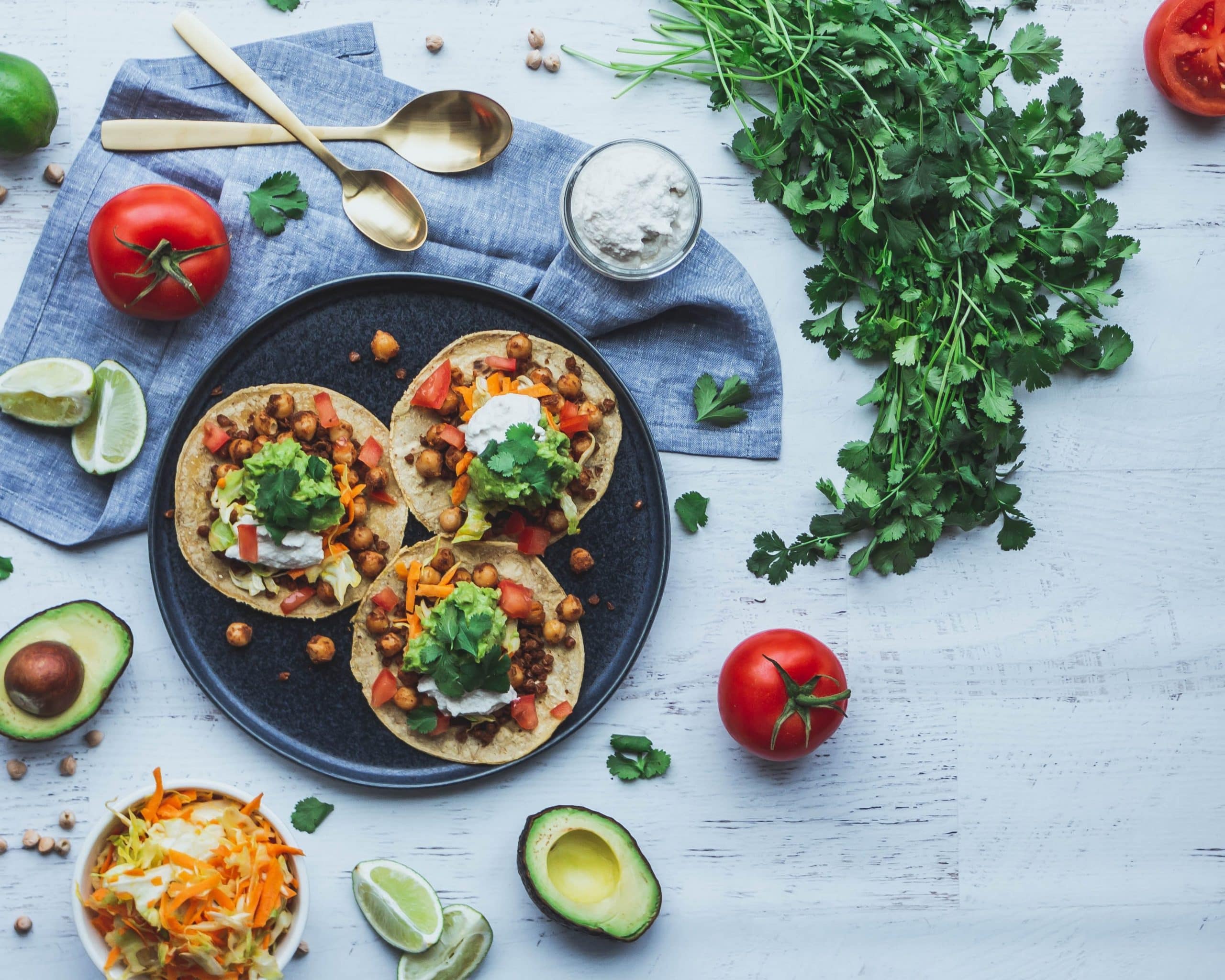
Meat-free weeks are becoming increasingly popular. Numerous events take place globally, at varying times throughout the year. Though they differ in place and date, they all share the same concept and goal – to encourage consumers to give up meat for one week, with the hope of showing them how easy it is to eat a more plant-based diet.
Worldwide, we have ‘World Meat-Free Week’, which most recently took place in September 2022. Over in the UK, there’s ‘UK National Vegetarian Week’, which ran in May. The Netherlands celebrated ‘Meat-Free Week’ in March, and in Spain, ‘Meatless Week’ took place in June. Let’s take a closer look at Spain’s initiative, also known as ‘Semana Sin Carne’.
Semana Sin Carne (SSC) is run by ProVeg’s Spanish team, and like most meat-free weeks, it encourages people to follow a plant-based diet for seven days. ProVeg Spain’s aim is to make the week as easy as possible for participants, providing sign-ups with all the tools they need to start their meat-free diet, and to make it as entertaining, healthy, and delicious as possible. Those who take on the challenge receive a week’s menu with recipes, a helpful infographic to enable them to create their own dishes, comparison tables, daily nutrition advice and support, as well as an empowering community through the SSC Facebook group.
ProVeg is well-positioned to offer brands and retailers expert advice on how best to strategise meat-free weeks. In 2021, The Vegetarian Butcher partnered with ProVeg Spain for June’s SSC. The brand was featured in two separate newsletters (with more than 4,900 recipients) for the event, with their company’s history being detailed in one, and a recipe by them in the other. The newsletter with the history of The Vegetarian Butcher garnered 64 clicks on their website, while the newsletter with their recipe brought the brand 24 new clicks on their website and 244 views of the recipe. The partnership brought The Vegetarian Butcher’s products to the attention of SSC participants and put them in a better position to gain new customers.

Businesses should get involved because SSC is a great opportunity to amplify their audience – people who join SSC are mainly flexitarians and people who barely know about plant-based alternatives, so they will find new potential customers. SSC enjoys prestige in the national press, too [and] we are well positioned to national cooking influencers who lead the opinion on recipes and products. So, SSC is not only an investment for gaining clients but also a way to achieve better SEO and more meaningful relationships with content creators.”
Make sure you know the dates of the meat-free weeks most relevant to your audiences; for example, if you ship your products globally, make sure to prepare for World Meat-Free Week. If you’re a retailer based in Spain, keep an eye on Semana Sin Carne (which will be returning to its original date in 2023 – March, coinciding with World Meat Free Day).
Action:
- Brands/retailers should take note of meat-free weeks around the world where their products are sold, and increase plant-based product launches, promotions, and marketing during these weeks.
- Brands/retailers should partner with ProVeg for expert advice and international exposure for their plant-based promotions.
BBQ season

The number of BBQs being held around Europe has risen sharply in recent years, with the UK taking the top spot after holding a staggering 165-million BBQs in 2021, closely pushing Germany into second place.3 Market worth has also skyrocketed, with the overall BBQ and alfresco-dining sector in Europe being valued at just over £2.2 billion in 2021, up from £150 million in 1997.
Along with the UK and Germany, France, Italy, and Poland are leading the BBQ market in Western Europe, largely due to the increasing trend of spending time with family and friends for outdoor BBQ activities.4 Much of this can be attributed to COVID-19 lockdowns throughout 2020 and 2021; with restaurants closed and socialising moved into homes or outside, many people opted for holding BBQs. Summer and Easter continue to be the most popular times to hold a BBQ, with the UK hosting 15 million cookouts over Easter weekend alone.5
So, why does this matter to players in the plant-based category? Simply put, it’s because plant-based meat products are rapidly gaining popularity with European consumers, and as such, are fast becoming a bigger part of BBQ spreads.
According to a recent pan-European survey led by ProVeg International, 40% of all consumers in Europe now identify as either flexitarian, vegetarian, pescatarian, or vegan. And with 86% of all plant-based purchases being made by flexitarians, it stands to reason that some of these purchases make their way onto our outdoor grills. Indeed, an estimated 29% of all BBQs in 2021 contained a primarily vegetarian or vegan base.6
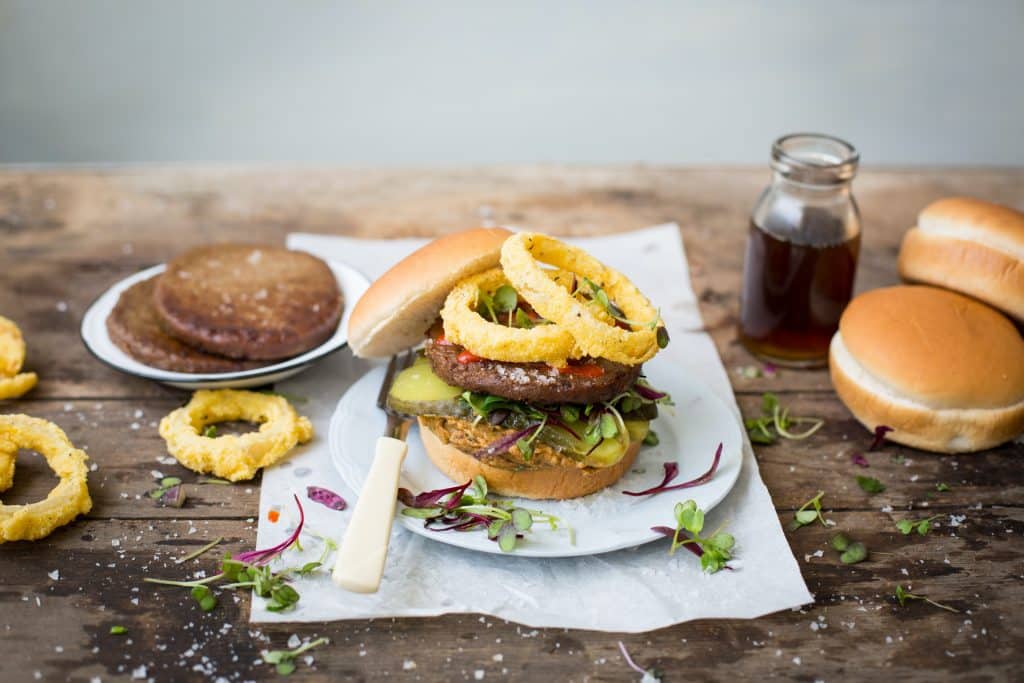
As more consumers adopt flexitarian diets, we are seeing a shift in BBQ-food-purchasing behaviours in favour of more plant-based versions of favourite BBQ-related products. Indeed, in the last two years, the meat-free sector has shot up 49% in value, with the dairy-free market close behind.7 By 2025, it is estimated that meat and dairy alternatives will be worth 7.5-billion euros in Europe, up from 4.4-billion euros in 2019.8 With so much to gain, it is therefore vital that brands get with the groove and keep a tab on changing consumer preferences and on the growing plant-based market, tailoring their offerings to ensure they do not miss out on sales. You should therefore use BBQ seasons (Easter and summer) as opportunities to grab the attention of flexitarian consumers and increase your plant-based sales.

ProVeg Tips
If you’ve not yet delved into the plant-based meat sector, now is the time to do so. ProVeg can help. Get in touch with us at [email protected] to learn what it takes to create the perfect meat-free product and how best to market it to consumers during key moments of the year and beyond.
So, how best to approach BBQ season?
When it comes to producing plant-based BBQ foods, your products can’t compromise on experience. Indeed, almost two-thirds of consumers prefer products that are similar to foods they already know.9 Therefore, in order to appeal to flexitarians, it’s essential that your offerings replicate the taste, texture, and look of animal-based meat. To get a better idea of how to achieve this, let’s take a look at what ingredients are best, and players currently leading the industry.
Case Study: The Beyond Burger by Beyond Meat
Today, Beyond Meat is worth more than $1 billion. To what do they owe their success? The brand says that it is in large part due to the success of its Beyond Burger in replicating the experience of eating a beef burger. How did it achieve such a feat? Through intense R&D and continued investment in product development, focusing on finding exactly the right ingredients.
Beyond Meat was one of the first brands to use non-GMO, gluten-free pea protein in their products, including in their Beyond Burger. Pea protein works really well in plant-based meat products for many reasons – its high-protein content, resemblance in texture and consistency to meat, easy availability, and quick preparation are a few of the ‘whys’. But it takes much more than the use of pea protein to recreate meat.

In an interview with Business Insider, Beyond Meat CEO Ethan Brown explained: “If you look at it long enough from different angles and as much as you possibly can, you begin to understand that meat is knowable and material. It’s essentially these five things. It’s amino acids, lipids, trace minerals, trace vitamins, and water. None of those are exclusive to animals. They’re all present in the plant kingdom.”10
Brown’s R&D team worked hard to find these five elements in plants in order to use them to replicate the entire experience of eating meat. To achieve this with the Beyond Burger, 22 ingredients were required:
- Water
- Pea protein isolate
- Expeller-pressed canola oil
- Refined coconut oil
The Beyond Burger also contains 2% or less of:
- Cellulose from bamboo
- Methylcellulose
- Potato starch
- Natural flavour
- Maltodextrin
- Yeast extract
- Salt
- Sunflower oil
- Vegetable glycerin
- Dried yeast
- Gum arabic
- Citrus extract (to protect quality)
- Ascorbic acid (to maintain colour)
- Beet juice extract (for colour)
- Acetic acid
- Succinic acid
- Modified food starch
- Annatto (for colour).11
Yet, the brand’s famous plant-burger is not set in stone; Beyond Meat will continue innovating and improving all its products until it creates the “perfect replication” of meat.12 Brown told Business Insider that the company is about 70% of the way there.
“More so than worrying about competition, I worry about how we make the products that we currently have on the shelf obsolete by improving them.”13
Beyond Meat’s success demonstrates the importance of product development, with continued research into the best ingredients to ensure you have the best product possible. Certainly, that is what it takes to stand out in the ever-growing plant meat category and gain the biggest share of purchases, during BBQ season and at other times of the year.
Like Beyond Meat, Impossible Foods are innovating within the plant-meat industry by using new and improved vegan proteins and inventive ingredients. Impossible Burger uses a GMO form of plant haem, mimicking the natural haem iron that’s found in animal foods. This ingredient gives their burgers a distinct ‘meaty’ flavour and ‘bleeding’ experience, appealing to consumers’ sensory experience of meat.
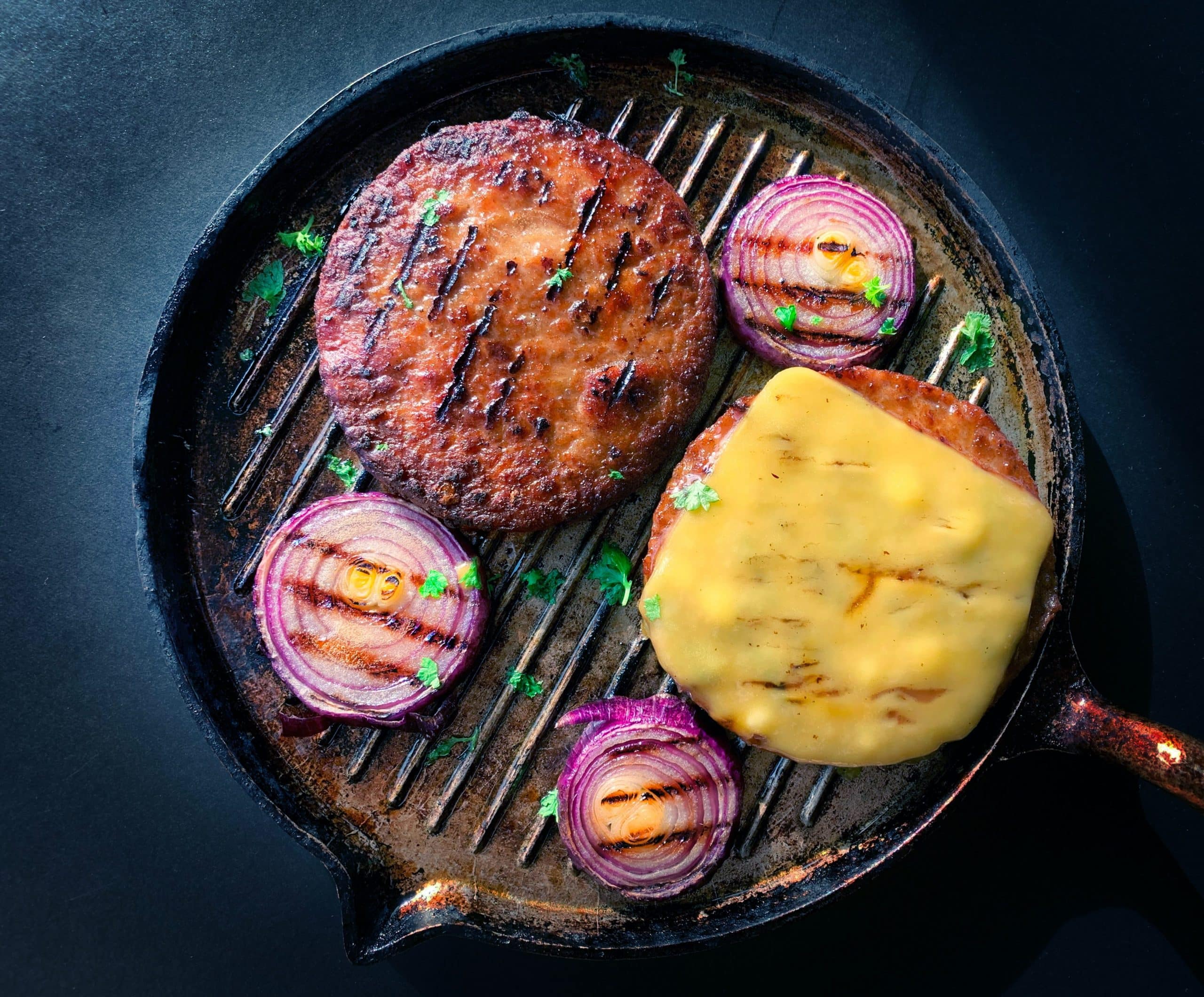
While soya protein is still leading the meat-free market, investment into these innovative ingredients and allergen-free protein sources is fuelling growth – pea, hemp, beans, oats, beetroot juice, coconut oil, and olive oil are just a few of these ingredients.
What marketing and merchandising approaches should be taken?
The location of plant-based products in stores and online really affects customer pick-up and purchase rates. Where and how you position them on a shelf and in which aisle or online category really matters. With animal-based products still dominating supermarket shelves and e-commerce sites, and with location in mind, how can we give a fair chance to plant-based items? It’s simple: by grouping them next to or near their conventional counterparts on shelves and on websites.
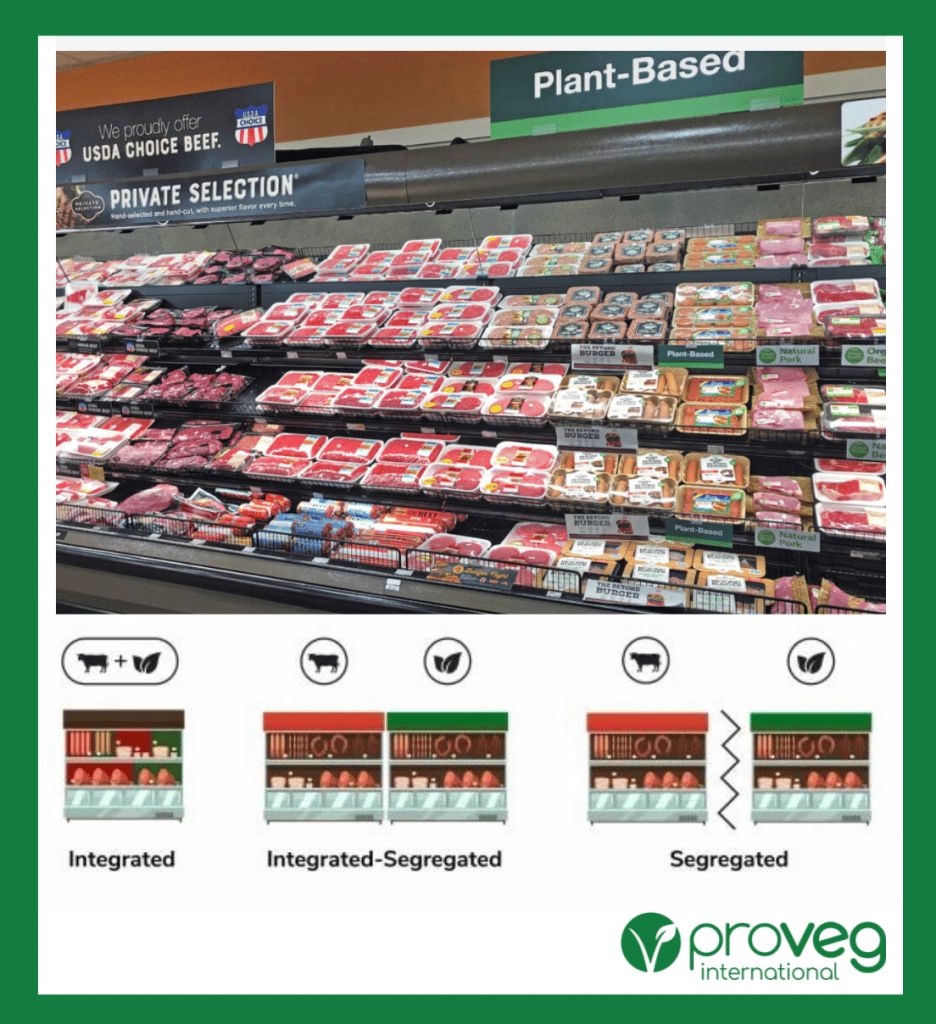
The reason that integrated merchandising (fully or partially) works to increase sales is because it puts plant-based products in front of the largest consumer audience: flexitarians, who are responsible for up to 90% of sales of plant-based alternatives.14

ProVeg Tips
ProVeg has extensive knowledge of flexitarian consumers in Europe, from general preferences to specific consumer sentiments regarding particular product categories. We regularly help retailers and brands with their plant-based merchandising, educational social media, and product development. Get in touch with us at [email protected].
By shifting the marketing focus of plant-based items from vegans to flexitarians and plant-forward eaters, retailers can unlock a total addressable market that is over 10 times larger! At ProVeg, we recommend utilising what’s known as an ‘integrated-segregated’ approach, whereby plant-based products are grouped together but positioned within animal-based-product aisles. This merchandising technique, which takes plant-based products to where the most potential shoppers are, can boost sales and aid sustainability, while still allowing vegans to access their favourite products.
Unsurprisingly, when asked what would help them choose healthier and more sustainable options, like plant-based meats, while shopping, 57% of consumers agreed that stocking meat-free products in the animal-based meat aisle would help.15
In 2021, US supermarket giant Kroger explored this concept with an experiment that ran across its stores. While some locations maintained separate plant-based and animal-based product aisles, other locations integrated these two aisles. The study found that integrating plant-based alternatives into conventional-meat aisles increased sales of plant-based products by 23%.16
Partnerships with ProVeg
In 2019 and 2020 ProVeg Germany started consulting Lidle Germany on their plant-based line. In particular, ProVeg ran a series of advice sessions and workshops – ‘Die vegane Werkstatt’ – to help Lidl develop its plant-based BBQ range. Together, the teams explored and discussed different plant-based alternatives, while the ProVeg Test Community contributed impactful ideas for product development, using a product configurator. Based on these suggestions, ProVeg Germany and Lidl created innovative plant-based products together with customers, utilising the expertise of nutrition experts and the know-how of chefs.17
“The plant-based market is becoming increasingly important,” said a spokesperson from Lidl. “This is why we are continuously developing our plant-based product range in line with customer needs. Under our own brands ‘My Best Veggie’ and ‘Next Level Meat’ as well as other Lidl brands, we have been offering various plant-based products such as tofu, burger patties, and pizzas for some time now. We have innovatively expanded this plant-based expertise with the help of the community in the co-creation campaigns Vegane Werkstatt in October 2019 and Vegane Grillwerkstatt in May 2020.”
The workshops were followed by a joint social-media campaign to publicise the launch of Lidl’s new plant-based range and private-label grill product. Launched just in time for the start of BBQ season, the campaign reached a community of more than 2.5-million people who do not usually engage with plant-based topics.
A spokesperson from Lidl commented, “With ProVeg, we have found a strong partner who supported us with their expertise on everything regarding plant-based diets – including a workshop, a survey with its Test Community, tips and facts, and a live digital event on the Lidl Instagram channel, with video instructions for meals.”
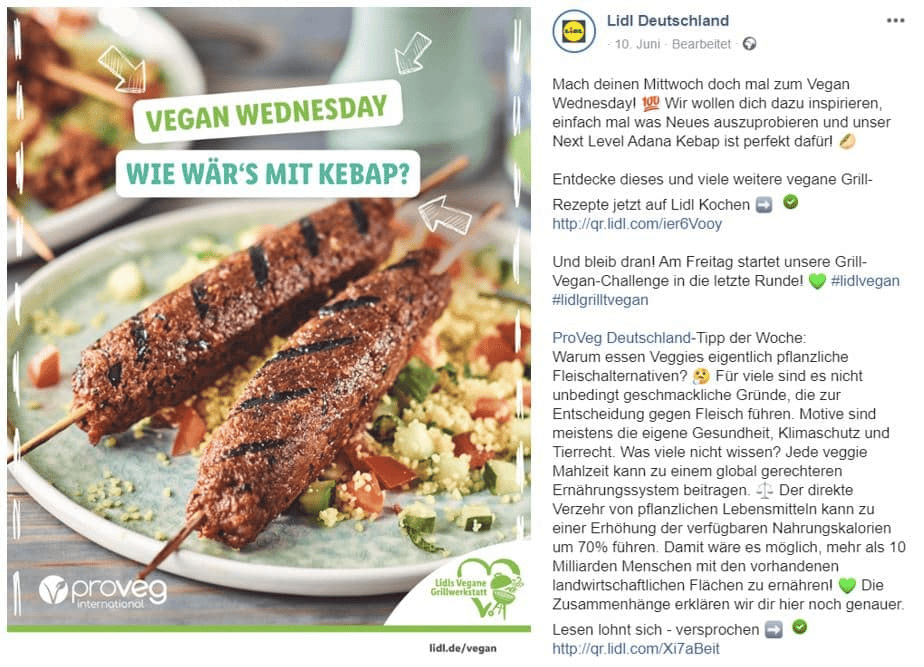
At the grand finale of the Vegane Grillwerkstatt, Dirk Liebenberg from ProVeg’s Food Industry & Retail team took the Lidl community behind the digital scenes of a plant-based barbecue. Among other things, he showed how plant-based aioli is prepared. “The virtual barbecue was a successful completion of the second stage of ProVeg’s collaboration with Lidl,” said Liebenberg. “It was great fun to get close to the community and to show how simple and tasty plant-based barbecues can be.”
In general, Dirk and his team conduct targeted market research and advise the food industry so that more and better plant-based products can be developed and made available.
We will continue to work with ProVeg in the future and will, for example, offer them, with our Vegan Wednesdays at Lidl-Kochen, a high-reach platform for their content.”
It’s great to see that major retailers are encouraging engagement via social-media channels with ProVeg’s support. Collaboration is the key to making knowledge about a plant-based diet available to a broad range of people in a short space of time. This will help us to reach new target groups and thus further increase the demand for plant-based alternatives. If you are interested in collaborating with ProVeg, please contact [email protected].
Actions:
- Brands should carry out continued product development and investment into new ingredients to achieve the ‘meatiest’ plant-meat products possible and drive purchases.
- Retailers should integrate placement of animal-based meats with plant-based meats to normalise these BBQ foods and appeal to convenience-seeking consumers.
- Brands and retailers should collaborate with ProVeg before and during peak barbequing seasons to learn how to optimise their plant-meat offerings and drive sales.
Conclusion
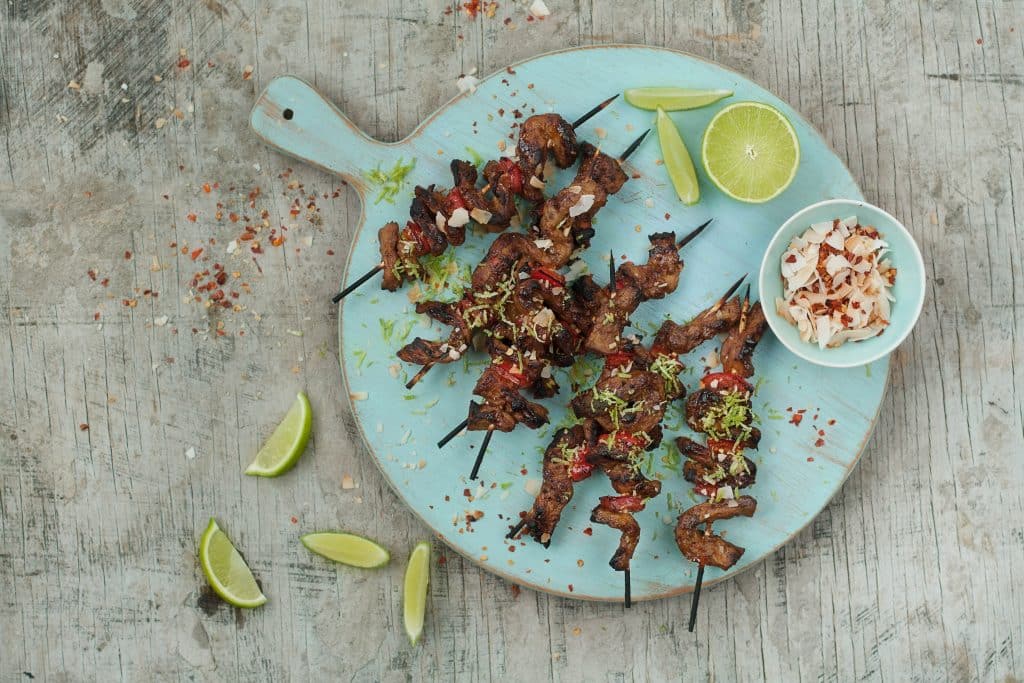
Businesses looking to target the ever-growing number of consumers eating plant-based products should take advantage of global food-related events and celebrations throughout the year. Engaging with these events, celebrations, and challenges is integral to boosting sales, as well as enhancing your company’s reputation. For No Meat May, Meat-Free Weeks, and BBQ season, here are the most important actions to bear in mind:
No Meat May
- Brands should increase their launches of ‘healthy’ plant-based products during May, and focus marketing efforts on the health benefits of a plant-based diet.
- Offer support to No Meat May participants by posting easy, tasty plant-based recipes on your websites and social media platforms during the month of May.
- Hold plant-based tasting counters in retail stores so that potential customers can ‘try before they buy’.
Meat-Free Weeks
- Take note of meat-free weeks around the world where your products are sold, and increase plant-based product launches, promotions, and marketing during these weeks.
- Partner with ProVeg for advice and international exposure for your plant-based promotions.
BBQ season
- Carry out continued product development and investment into new ingredients to achieve the ‘meatiest’ plant-meat products possible and drive purchases.
- Integrate placement of animal-based meats with plant-based meats to normalise meat-free BBQ foods and appeal to convenience-seeking consumers.
- Collaborate with ProVeg before and during peak barbequing seasons to learn how to optimise plant-meat offerings and drive sales.
If you missed Part I of this series, you can read it here. Make sure to check out Part III, which will cover Thanksgiving and Christmas.
If you’re looking to learn how to attract more customers and instigate a greater number of plant-based purchases, ProVeg can help. Get in touch to talk over and develop your plant-based strategy by emailing us at [email protected].
References
- Impact 2021 report, (2021). No Meat May. Available at: https://d1wawsg0a7g34j.cloudfront.net/a23ada10e28cf1a1363907f231731042.pdf. Accessed: 2022-10-25.
- Meat Free May Starts Next Week. Are you ready? (2015). The Flexitarian. Available at: http://theflexitarian.co.uk/less-meat-more-vegs/why-go-flexitarian/meat-free-may-starts-next-week-ready/. Accessed: 2022-11-01.
- Top 20 BBQ Facts, (2022). 26th National BBQ Week. Available at: https://nationalbbqweek.co.uk/bbq-facts/top-20-bbq-facts. Accessed 2022-11-07.
- Europe BBQ Grill Market Overview, (2021). All The Research. Available at: https://www.alltheresearch.com/report/146/barbeque-grill-market. Accessed 2022-11-07.
- Europe BBQ Grill Market Overview, (2021). All The Research. Available at: https://www.alltheresearch.com/report/146/barbeque-grill-market. Accessed 2022-11-07.
- Top 20 BBQ Facts, (2022). 26th National BBQ Week. Available at: https://nationalbbqweek.co.uk/bbq-facts/top-20-bbq-facts. Accessed 2022-11-07.
- Smart Protein Project (2021): What consumers want: A survey on European consumer attitudes towards plant-based foods. Country specific insights. European Union’s Horizon 2020 research and innovation programme (No 862957). Available at: https://smartproteinproject.eu/consumer-attitudes-plant-based-food-report/. Accessed 2022-10-18
- Plant-Based Meat Market Worth, (2020). Cision PR Newswire. Available at: https://www.prnewswire.com/news-releases/plant-based-meat-market-worth-8-3-billion-by-2025–exclusive-report-by-marketsandmarkets-301188146.html. Accessed 2022-10-31.
- Pohjolainen, P., M. Vinnari., & P. Jokinen (2015): Consumers’ perceived barriers to following a plant-based diet, cited in Szejda, K., T. Urbanovich, & M. Wilks (2020): Accelerating Consumer Adoption of Plant-Base Meat. The Good Food Institute. Available at: https://gfi.org/images/uploads/2020/02/no-hyperlinkedreferences-final-combined-accelerating-consumer-adoption-of-plant-based-meat.pdf Accessed 2022-10-20.
- What is in a Beyond Meat Burger? (2019). Business Insider. Available at: https://www.businessinsider.com/what-is-in-beyond-meat-burger-2019. Accessed: 2022-11-07.
- What is in a Beyond Meat Burger? (2019). Business Insider. Available at: https://www.businessinsider.com/what-is-in-beyond-meat-burger-2019. Accessed: 2022-11-07.
- What is in a Beyond Meat Burger? (2019). Business Insider. Available at: https://www.businessinsider.com/what-is-in-beyond-meat-burger-2019. Accessed: 2022-11-07.
- What is in a Beyond Meat Burger? (2019). Business Insider. Available at: https://www.businessinsider.com/what-is-in-beyond-meat-burger-2019. Accessed: 2022-11-07.
- Plant-based Foods: Will They Stay or Will They Go? (2019) The NPD Group. Available at: https://www.npd.com/news/press-releases/2019/plant-based-foods-will-they-stay-or-will-they-go/. Accessed 2022-10-18.
- Segregation or integration – Ranging plant-based products to drive sales (2021). Available at: https://www.igd.com/articles/article-viewer/t/segregation-or-integration-ranging-plant-based-products-to-drive-sales/i/27924 Accessed 2022-10-18.
- Plant-Based Meat Sales Increase An Average of 23% When Sold in the Meat Department (2020). Plant-Based Foods Association. Available at: https://www.plantbasedfoods.org/plant-based-meat-sales-increase-an-average-of-23-when-sold-in-the-meat-department Accessed 2022-10-18.
- ProVeg and Lidl Collaborate to grow the plant-based sector, (2020). ProVeg. Available at https://proveg.com/blog/proveg-and-lidl-collaborate/. Accessed 2022-11-08.

